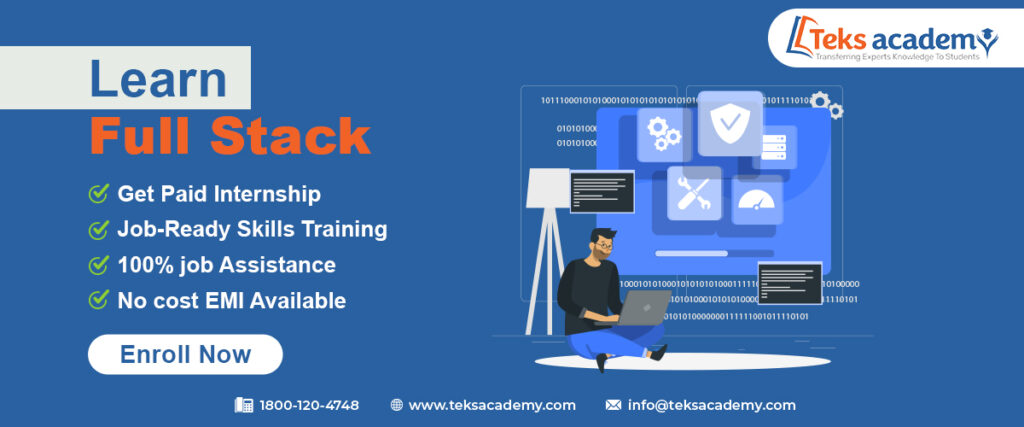

Websites play a crucial role in today’s digital era, which serves as the face of information for every individual and organization. The websites are the only sources that provide information, create engagement, and help to communicate with the user. With the evolution of technology, websites have become more interactive and dynamic that provides personalized user experience.
A front-end web developer is one who creates websites and interfaces. And the front-end engineer uses coding languages like CSS, HTML, JavaScript, and full-stack Python to ensure the design works online. This article gives you the tips and tricks that you should follow to become an expert in full-stack development.
The front-end developer focuses on the user side of the website and ensures that the website users can easily interact with the elements of the web page and navigate through the site with the help of the tools and designs created.
The front-end developer creates menus, layouts, and designs for the website. It uses programming languages like JavaScript, HTML, CSS, etc.
The backend developer works on the server side of the website. They take care of the functionality, structure of the website, operations, application programming interfaces (API), and databases.
Backend developers have advanced experience in server-side programming languages like Java full stack and Ruby to build applications.
A front-end developer should have a strong understanding of web technology. CSS, HTML, and JavaScript are the pillars that give you the foundation for your front-end development skills. Undergo course training like Python and Java full stack developer training. Stay up-to-date with the latest standards and practices in the current web design industry.
After having a better understanding of the basics, start looking into popular front-end frameworks and tools. Frameworks like Angular, Vue, and React.js give you strong tools for making dynamic and interactive web apps. Try out libraries like jQuery or Lodash to make common jobs easier and boost your work output. But don’t forget that it’s important to know the core languages (HTML, CSS, and JavaScript) before getting into frameworks. Knowing the basic ideas behind these tools will help you make better choices when you use them.
The best way to improve your skills in front-end development is by gaining hands-on experience with real-time projects. Start working on small projects initially and gradually increase your challenge to work on complex projects. Build personal websites, create interactive components, and contribute to open-source projects.
Real-time projects help you use your creativity, solve development issues, and learn the practical scenarios that require attention.
Front-end programming is a field that is always changing, with new frameworks, libraries, and tools coming out all the time. Follow reputable blogs, join relevant groups, and attend web development conferences to keep up with the latest industry trends. Talk to other developers, participate in groups, work with them, share ideas, and learn from each other. If you know about the most recent changes, you can shift quickly and stay competitive in the fast-paced world of front-end development.
Front-end development is a vast area where you must learn many details to become an expert. To add to your skill set, spend time learning new technologies, such as CSS preprocessors, build tools, testing frameworks, Java full stack developer training, or server development. When you know how everything works together, you can see the big picture and be a useful development team member. Also, challenge yourself by working on larger websites, taking online courses, and getting proper certifications. Adopt a growth attitude, be willing to learn from your mistakes, and ask experienced developers for feedback to keep getting better.
The given details are the tips that help every front-end developer get on a professional growth track. When it comes to decisions, a front-end developer should know what has to be done to satisfy the client or the organization. Let’s look at a list of tips that will help you improve your front-end developer skills.

The front-end developer’s salary ranges from Rs. 3.30 LPA to 20 LPA depending upon the years of experience they hold.
| Experience | Average Salary Range (Per Annum) |
| <1 yr | 3.30 LPA |
| 1-4 yrs | 5 LPA |
| 5-9 yrs | 10 LPA |
| 10-19 yrs | 20 LPA |
To become an expert front-end and back-end developer, you need to keep learning and put what you’ve learned into practice. By getting good at the basics, learning about systems, working on real-world projects, keeping up with industry trends, and learning new skills, you’ll be on your way to becoming a professional. Remember that becoming an expert doesn’t happen in a day; it’s a process that takes time and patience.
Accept the challenges, celebrate your wins, and keep pushing yourself to learn and grow. With hard work and the right attitude, you’ll do well in front-end development and take advantage of exciting possibilities in the world of web development, which is always changing.